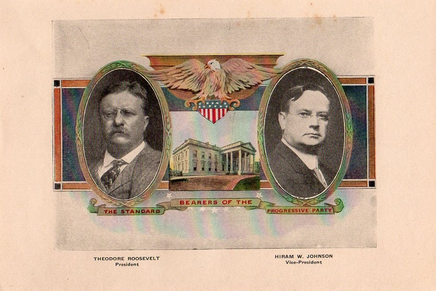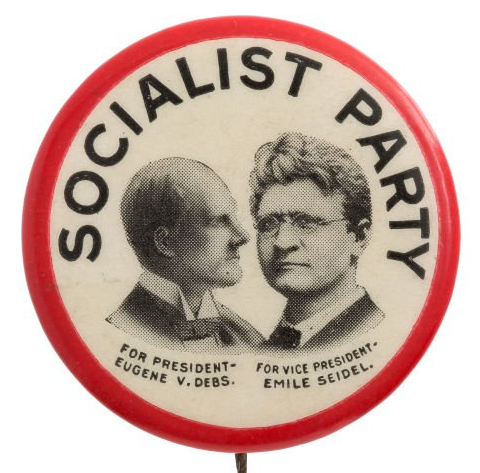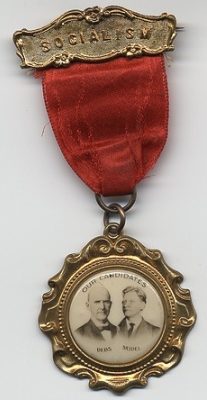Showing posts with label election of 1912. Show all posts
Showing posts with label election of 1912. Show all posts
Tuesday, June 18, 2019
Hiram Warren Johnson
Hiram Warren Johnson, September 2, 1866 (Sacramento, Calif.) – August 6, 1945 (Bethesda, Md.)
VP candidate for Progressive Party (aka Bull Moose Party) (1912)
Running mate with nominee: Theodore Roosevelt (1858-1919)
Popular vote: 4,122,721 (27.40%)
Electoral vote: 88/531
The campaign:
This is The Big One in the history of third parties in America.
Theodore Roosevelt failed in his bid to reclaim the presidency as a Republican at their convention. The conservative Taft forces outmaneuvered the liberal wing of the party. So Theodore Roosevelt being Theodore Roosevelt decided to perform an end run and make a bid as a third party candidate in the newly formed Progressive Party. His running mate was the reformist Governor of California Hiram Johnson.
It was a remarkable election, with three presidents-- past (Roosevelt), present (Taft), and future (Wilson)-- plus the Socialists at the height of their national electability. The nastiness of the name-calling and and personal nature of the insults between the Republicans and the Progressives seemed beyond the usual campaign mud-slinging.
The Progressive platform was filled with planks that had been well worn by the Populists and Socialists in the 1890s, but by 1912 many of those ideas were now socially acceptable.
Roosevelt was shot on Oct. 14, 1912 in Milwaukee, wounded in the chest but the bullet was slowed by TR's thick folded typewritten speech and his spectacles case. Not one to let good theater slip away, he gave his speech anyway. John Schrank, the would-be assassin, was found legally insane. All three of the major parties took a brief break from electioneering until Roosevelt recovered.
The Roosevelt/Johnson ticket placed second with 27.40% of the popular vote and 88 electoral votes. The Republican incumbent landed in third place.
On the ballot in 47 states the Progressives won the electoral votes of South Dakota, California, Michigan, Minnesota, Pennsylvania, and Washington. In California Roosevelt defeated Wilson by just under 200 votes, demonstrating the wisdom of placing Johnson on the ticket.
Impressive as this third party showing was, it could be argued that the Progressive Party was personality-driven and not policy-driven. Case in point-- as soon as Roosevelt rejoined the Republican fold the Progressive Party evaporated. Johnson went on to become a gadfly Republican in the US Senate, holding the record for longevity in that office from California.
Election history:
1911-1917 - Governor of California (Republican/Progressive)
1917-1945 - US Senate (Calif.) (Republican)
1920 - Republican nomination for US President - defeated
1924 - Republican nomination for US President - defeated
Other occupations: stenographer, attorney, assistant district attorney of San Francisco
Buried: Cypress Lawn Memorial Park (Colma, Calif.)
Notes:
Buried in the same cemetery as Joseph Alioto, Hubert Howe Bancroft, Eddie Fisher, William
Randolph Hearst Jr. and Sr., Tom Mooney, and Lincoln Steffens.
Declined to be Warren Harding's running mate in 1920.
One of his opponents in the 1916 Senate race was George S. Patton Sr., father of the later general.
One of his opponents in the 1922 Senate race was Socialist Upton Sinclair.
One of his opponents in the 1928 Senate race Charles Hiram Randall, the only member of the
Prohibition Party ever elected to the US House.
One of his opponents in the 1934 Senate race was George Ross Kirkpatrick, Socialist Party of
America VP nominee 1916.
Son of Grove L. Johnson (1841-1926) a Republican Congressman from California (1895-1897)
Although he voted to declare war with Germany he opposed America's entry into WWI, supported
the prohibition of Japanese immigrants, opposed the League of Nations and the United Nations. He supported FDR in the 1932 and 1936 elections. He was instrumental in the creation of the Japanese-American internment camps during WWII.
The old isolationist died the same day the atomic bomb was dropped on Hiroshima.
Monday, June 17, 2019
Emil Seidel
Emil Seidel, December 13, 1864 (Ashland, Penn.) – June 24, 1947 (Milwaukee, Wis.)
VP candidate for Socialist Party of America (1912)
Running mate with nominee: Eugene V. Debs (1855-1926)
Popular vote: 901,551 (5.99%)
Electoral vote: 0/531
The campaign:
"This is our year," declared Eugene Debs in 1912. And he was right. In electoral politics, the Socialist Party of America would never have a better year.
The SPA had been rocked by conflict within the Party. This organization consisting of mostly white males had schisms on issues like the role of women in the SPA, immigration, and race. They also had a left/right split on the IWW and whether or not to engage in outright class struggle or work from within the capitalist system for reforms.
The right wing of the Party, called "Sewer Socialists," made a strong bid for the presidential nomination to displace Debs, who had already been the nominee three times. Their mistake was running two candidates against Debs instead of one, splitting the votes of the Convention's conservatives. One of those failed challengers was Emil Seidel, who was then made the VP nominee.
There had been previous Socialist mayors in America, but Seidel was the first one from a major city-- Milwaukee, Wisconsin, elected in 1910, but defeated for re-election in early 1912.
The 1912 platform included many ideas that have since come to pass, illustrating that even though the party itself splintered and diffused at least their ideas endured and were absorbed by the mainstream political entities. But there were also several planks that have yet to happen, including:
The abolition of the Senate and of the veto power of the President. -- The election of the President and Vice-President by direct vote of the people. -- The granting of the right of suffrage in the District of Columbia with representation in Congress and a democratic form of municipal government for purely local affairs. -- The extension of democratic government to all United States territory.
This was the last presidential election to date where four candidates received more than 5% of the vote. The Debs/Seidel ticket placed a solid fourth with 5.99%. On the ballot in all 48 states they placed second in Florida, and third beating the incumbent Republican Taft in Nevada, California, Louisiana, and Mississippi. Their best showings were in Nevada (16.47%), Oklahoma (16.42%), Montana (13.64%), Arizona (13.33%), Washington (12.43%), California (11.68%), and Idaho (11.31%). They actually carried two counties in Minnesota and a county each in North Dakota and Kansas.
And all of this while an even more successful third party was upsetting the status quo. The election of 1912 must have been Heaven for the politicos of the day.
Election history:
1902 - Governor of Wisconsin (Social Democratic Party) - defeated
1904-1909 - Alderman, Milwaukee, Wis. (Social Democratic Party)
1908 - Mayor of Milwaukee, Wis. (Social Democratic Party) - defeated
1910-1912 - Mayor of Milwaukee, Wis. (Social Democratic Party)
1912 - Mayor of Milwaukee, Wis. (Socialist Party of America) - defeated
1912 - Socialist Party of America nomination for US President - defeated
1914 - Mayor of Milwaukee, Wis. (Nonpartisan) - defeated
1914 - US Senate (Wis.) (Socialist Party of America) - defeated
1916-1920 - Alderman, Milwaukee, Wis. (Nonpartisan)
1918 - Governor of Wisconsin (Socialist Party of America) - defeated
1932-1936 - Alderman, Milwaukee, Wis. (Nonpartisan)
1932 - US Senate (Wis.) (Socialist Party of America) - defeated
Other occupations: woodcarver, pattern-maker, spice mill worker
Buried: Lincoln Memorial Cemetery (Milwaukee, Wis.)
Notes:
The victor in his 1902 race for Wisconsin Governor was Republican Robert M. La Follette.
Although the Socialist Party of America had changed their name from the Social Democratic Party, in
some jurisdictions the old moniker was still on the ballot for several elections.
Son of German immigrants.
His family moved from Pennsylvania to Wisconsin in 1867.
Lived in Berlin ca. 1886-1892 to learn the art of woodcarving. Became a socialist during this period.
Married in 1895, divorced in 1924.
Originally joined the Socialist Labor Party but was part of the great split ca. 1899.
Operated in Redmond, Washington as a SPA official in 1901.
While Mayor, the poet Carl Sandburg was his secretary.
Arrested Nov. 12, 1917 in Horicon, Wis. for making an anti-war speech.
Enjoying creating paintings, writing poems, and composing music.
The burial place of his cremated remains were unmarked until a volunteer effort was made to place a
marker there in 2017.
Sunday, June 16, 2019
August Gillhaus
August Gillhaus, June, 1867 (New York, NY?)- May 4, 1932 (New York, NY)
VP candidate for Socialist Labor Party (aka Industrial Labor Party) (1912, 1920)
Running mate with nominee (1912): Arthur E. Reimer (1882-1969)
Running mate with nominee (1920): William Wesley Cox (1865-1948)
Popular vote (1912): 29,324 (0.19%)
Popular vote (1920): 31,084 (0.12%)
Electoral vote (1912): 0/531
Electoral vote (1920): 0/531
The campaign (1912):
The Socialist Labor Party was pretty much lost in the shuffle in an election year when other third parties were taking up all the political oxygen. The Party continued their trajectory to an isolated and sectarian philosophical territory. It would be the final election in which SLP leader and polarizing figure Daniel De Leon was involved.
The Party's 1912 platform was unusual due to the length of the text. However it was still familiar in that the content was not so much specific statements on various policies but more of a general essay on class struggle.
The SLP was on the ballot in 21 states, placing dead last in every single one. Their two best results, both at 0.66% were Minnesota and Connecticut.
The campaign (1920):
The post-WWI government "Red Scare" prosecution of any organization to the left of the Democratic Party impacted the SLP's ability to spread their message via the postal service. Also, the SLP's membership included many immigrants who were threatened with deportation.
The SLP lost a number of members to the Communist Party in the wake of the Russian Revolution, these defectors were characterized by the SLP as "a handful of sentimentalists." The differences between the SLP and the Communists would sharpen in the coming years.
On the ballot in only 14 states, where they placed last every time, their strongest result was in Minnesota with 0.79%.
Election history:
1903 - New York State Assembly (Socialist Labor) - defeated
1904 - US House of Representatives (NY) (Socialist Labor) - defeated
1905 - New York City Controller (Socialist Labor) - defeated
1908 - US President (Socialist Labor) - defeated
1914 - New York State Engineer and Surveyor (Socialist Labor) - defeated
1916 - US Senate (NY) (Socialist Labor) - defeated
1917 - New York City Controller (Socialist Labor) - defeated
1918 - Lt. Governor of New York (Socialist Labor) - defeated
1929 - New York City Controller (Socialist Labor) - defeated
1930 - Attorney General of New York (Socialist Labor) - defeated
Other occupations: bricklayer, engineer, cigar maker
Buried: possibly cremated and placed in a SLP-owned niche, Fresh Pond Crematory and Columbarium (Middle Village, NY)
Notes:
The first time a prior presidential nominee of any party subsequently ran for Vice-President.
Charles Gillhaus, his father, had immigrated to New York from Germany in 1864.
Friday, June 14, 2019
Aaron Sherman Watkins
Aaron Sherman Watkins, November 29, 1863 (Rushsylvania, Ohio) – February 9, 1941 (Rushsylvania, Ohio)
VP candidate for Prohibition Party (1908, 1912)
Running mate with nominee (1908, 1912): Eugene W. Chafin (1852-1920)
Popular vote (1908): 254,087 (1.71%)
Popular vote (1912): 208,156 (1.38%)
Electoral vote (1908): 0/483
Electoral vote (1912): 0/531
The campaign (1908):
Legal prohibition of alcohol across state and local jurisdictions had taken a dramatic rise since the 1904 election.
CSA Army veteran Rev. William B. Palmore who had failed to gain the presidential nomination was given the VP nod, but he declined, opening the way for Aaron S. Watkins.
The first two planks of the 11-point party platform dealt with alcohol, but among the remaining policies were: The election of United States Senators by direct vote of the people, Equitable graduated income and inheritance taxes, The strict enforcement of laws instead of official tolerance and practical license of the social evil which prevails in many of our cities with its unspeakable traffic in girls, The prohibition of child labor in mines, workshops, and factories, and finally most interesting and curious of all-- Legislation basing suffrage only upon intelligence and ability to read and write the English language.
The 1908 election had a funny symmetry that perhaps only those of us who enjoy trivia would notice. In a way there were three contests taking place. 1-- The two Williams, Taft vs. Bryan. 2-- The two Eugenes, Debs vs. Chafin. 3-- The two guys named Thomas, Hisgen vs. Watson.
The Prohibition Party placed 4th nationally in a race with up to seven parties on the presidential ballot.
Presented as an option in all but six states, the Chafin/Watson ticket had their best showing in South Dakota where they placed third with 3.52%. They also made third place in Michigan, Pennsylvania, Indiana, West Virginia, Iowa, Nebraska, Delaware, Maryland, Virginia, and Kentucky. This would be their 4th best presidential election.
The campaign (1912):
The Chafin/Watkins ticket was offered a second time, a testimony to the leadership abilities of both gentlemen within the Party. But 1912 would be one of the wildest presidential elections, making it more difficult for the Prohibition Party to fight for attention.
The introduction to the 1912 platform demonstrated the Prohibition Party's view of the role of alcohol being the cause of many social problems.
"The alcoholic drink traffic is wrong; is the most serious drain on the wealth and resources of the nation; is detrimental to the general welfare and destructive of the inalienable rights of life, liberty and the pursuit of happiness. All laws taxing or licensing a traffic which produces crime, poverty and political corruption, and spreads disease and death should be repealed. To destroy such a traffic there must be elected to power a political party which will administer the government from the standpoint that the alcoholic drink traffic is a crime and not a business, and we pledge that the manufacture, importation, exportation, transportation and sale of alcoholic beverages shall be prohibited."
The remainder of the 1912 platform was similar to the 1908 version except the literary test for suffrage was deleted. Added to the revised document was: Suffrage for women on the same terms as for men, and, A presidential term of six years, and one term only.
The Party placed 5th nationally, with their tally recorded in all but 8 states their best showings were in Florida (3.65%) and California (3.45%). Vermont and Delaware were the only two states where they outpolled the Socialists.
Election history:
1904 - US House of Representative (Ohio) (Prohibition Party) - defeated
1905 - Governor of Ohio (Prohibition Party) - defeated
1916 - US Senate (Ohio) (Prohibition Party) - defeated
1920 - President of the United States (Prohibition Party) - defeated
1922 - Governor of Ohio (Prohibition Party) - defeated
1928 - Prohibition Party nomination for US President - defeated
1932 - Governor of Ohio (Prohibition Party) - defeated
Other occupations: President of Asbury College 1909-1910, Methodist minister, attorney, teacher,
Buried: Equality Cemetery (Rushsylvania, Ohio)
Notes:
The second time a third party ran the same ticket two elections in a row, the first being Debs-Hanford
(Socialist) 1904-1908.
Grandfather of 2000 Prohibition Party VP nominee Willard Dean Watkins.
Held the rank of Captain during WWI while an instructor at Miami Military Institute (Germantown,
Ohio)
Was preparing to run for Governor of Ohio when nominated as VP in 1908, so he withdrew from the
gubernatorial campaign.
Debated Clarence Darrow on the subject of prohibition of alcohol in Oshkosh, Wis. on Aug. 30,
1909.
Subscribe to:
Comments (Atom)

















































